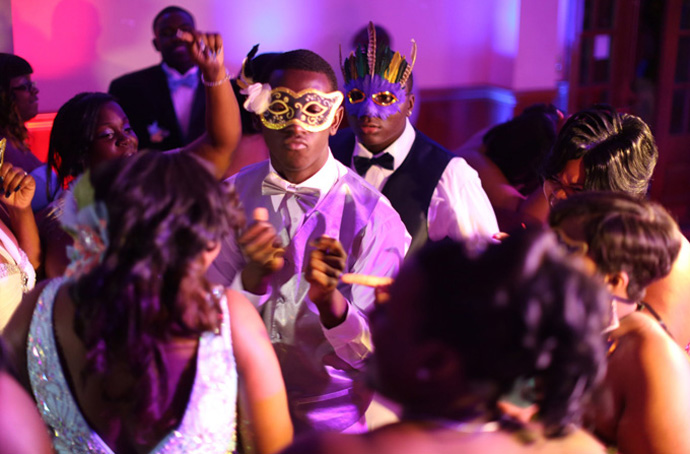 Students danced for hours to music provided by Pete’s Mobile DJ Service from Houston DJ Pete Armendariz read about the integrated prom on CNN.com and offered up his services at no cost. (CNN Photo/Brandon Ancil)
Students danced for hours to music provided by Pete’s Mobile DJ Service from Houston DJ Pete Armendariz read about the integrated prom on CNN.com and offered up his services at no cost. (CNN Photo/Brandon Ancil)
by Jamie Gumbrecht
WILCOX COUNTY, Georgia (CNN) — It’s a springtime tradition in this stretch of the magnolia midlands for crowds to gather at high school students’ proms. They’ll cheer for teens in tuxedos and gowns while an announcer reads what the students will do once they leave this pecan grove skyline.
Earlier last month, Wilcox County High School senior Mareshia Rucker rode to a historic theater in the nearby town of Fitzgerald to see her own classmates’ prom celebration. She never left the car, even to catch up with her friends. She’d recently helped to invite the critical gaze of the world to her county; few would be happy to see her there, she said. Besides, she’s Black and wasn’t invited to this prom reserved for White students anyway.
For as long as most remember, Wilcox County High School hasn’t sponsored a prom for its 400 students. Instead, parents and their children organize their own private, off-site parties, known casually as White prom and Black prom — a vestige of racial segregation that still lives on.
“When people say that seeing is believing, it truly is,” Mareshia says a few days later from the comfortable bustle of her family’s kitchen, central command for the three generations that share it.
“Just talking about it, it didn’t hurt my feelings. I didn’t care, she says. “When I saw it, I felt really crappy. I didn’t understand what was so different about me and them.”
She apologizes as her eyes grow shiny and tears dribble down her face. Toni Rucker swoops in to fold her arms around her oldest daughter.
“What is the difference,” she murmurs, Mareshia’s head resting on her chest. “There is no difference.”
Mareshia and her friends bucked 40 years of local customs last month by organizing their own integrated prom, a formal dance open to Wilcox County’s White, Black, Latino and Asian high school students. Organizers, both Black and White, said they lost friends in the process — a grim experience in the waning weeks of the school year. It’s been hard on the rest of their hometown, too.
When the story erupted on TV and social media, Wilcox County became a symbol of race relations stuck in the past. People around the world heard about the sneers from some classmates, the silence from some adults, the school board that says it supports them but didn’t sponsor its own prom. Thousands lashed out at the old tradition or offered up kind words, cash, dresses, a DJ. Stunned, they wanted to know, could this be true? In 2013?
Segregated proms are a longstanding reality in this farming community 160 miles south of Atlanta, and until recently, at several schools nearby. Some in Wilcox County say it’s just an old habit that’s hard to break. A few argue the proms are private because of cost and liability or because parents won’t cede control. They say people “self-segregate,” and kids can’t agree on country or hip-hop, “White music” or “Black music.”
Some say some preachers and some parents implicitly encourage segregation, but there’s no point to arguing: People are entitled to their opinions, even if they’re racist.
Plenty here shrug off the debate entirely and say a high school dance is nothing to make a fuss about.
Mareshia is 17, a good student, a cheerleader who’s active in the Junior Reserve Officer Training Corps. She knew long ago that proms were segregated, but she didn’t think much about it till last year, when she and three friends first realized they’d be split up.
“How do you want your last moments of high school to be,” Mareshia asked herself then. “What do you want your memories to encompass?”
More than 40 years after these South Georgia schools desegregated, students are still separated on what they see as the brightest nights of their lives. Some from all the county’s small towns — Abbeville, Pineview, Pitts, Rochelle — say nobody ever questioned the segregation till this year. But keep asking, and high school graduates will say they wondered about it, questioned it or even asked to make a change. Until this year, the plans always fell through.
“We were different because we always have been together throughout school,” Mareshia said. “We’ve cheered together at football games. We’ve gone to each other’s houses and spent the night…There was no need in us having two separate [proms.]”
High school is brief, though, and memories are short. Decades earlier, Wilcox County alumni remembered, there was no prom at all.